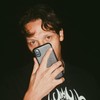This article originally appeared on VICE Netherlands.Polina Frank, 22, is a tattoo artist and journalism graduate from Kyiv. I meet her on a sunny Tuesday evening at Amsterdam’s Mosel Mosel tattoo parlour, where she’s currently working. Despite the late hour, Frank is busy filling in the last remaining spot on an Italian woman's leg with a psychedelic motif. Above her hangs a piece of paper with bank account details of Ukrainian organisations accepting donations.
Advertisement
Frank is among the 6.6 million refugees who have fled Ukraine in the aftermath of the Russian invasion. As countries like Germany appear to falter on sending continued equipment to the war torn country, people like Frank are choosing to pick up the slack in what little ways they can.Frank herself escaped Ukraine through Poland on her own back in April. When the war started, many of her friends enlisted and were sent to the Donetsk region in Eastern Ukraine. The area, which has been under Russian control since 2014, is currently on the frontlines of the war. Her friends have told her their battalion has experienced heavy losses, and she struggles to make sense of how she’s in a safe place right now while they are not.“I would like to defend my country, but they aren’t taking volunteers anymore, especially if you have no military experience,” Frank said. “I can actually do much more for them in the Netherlands.”
Advertisement
Since leaving Ukraine, she’s moved in with a friend who also works at Mosel Mosel. Two days a week she tattoos customers. The rest of the time she scours the web for deals on military equipment. Combat boots, binoculars, tactical backpacks, night vision goggles, sleeping bags, gloves, camouflage suits, holsters for ammunition magazines: A large portion of her hard-earned cash goes towards anything she can find that could give her friends a better chance at survival.
Left: Frank shows me the last piece of equipment she sent, a laser scope to attach to a rifle. Right: the piece of paper of Ukrainian organisations collecting donations.
The items she buys are first shipped to her mother in the eastern city of Dnipro, where her family is from. Then, her mum arranges the logistics inside Ukraine. She only sends stuff to people she knows personally, because she’s afraid scammers might take advantage of the situation, for instance, by reselling donations on eBay. “Every day when I open my DMs, I see more than 20 messages of people asking for stuff,” she says.In the meantime, Frank tries to stay in touch with her friends on the front. “Every time I talk to them, I feel a little better,” she says. “They joke around more than I do, and they don't seem to be afraid of anything. They probably don’t even have time for that at all.” Her friends share pictures of the gear she sent them. She says they’re pretty happy with it – which, given she didn’t know exactly what most of the equipment was for before starting to do this, wasn’t an immediate given.
Advertisement
Frank working on her psychedelic-style tattoo.
Frank started buying military gear in the first days of the war, when she was still in Ukraine. Unfortunately, the supplies available in the country ran out quickly, so she relied on donations from friends who live abroad. When the situation in Kyiv became so threatening, she packed up her tattoo kit and left. “I was super scared all the time, it was hard to live there,” she says. “I couldn't make any money because people aren’t really getting new tattoos in this situation. And the donations I received were bound to stop one day.”When I ask her if she thinks the equipment she procured could have been used to kill people, Frank replies with a firm “of course”, adding: “They [Her friends] kill Russians every day. Because if they don't, they will be killed themselves.”Frank was 14 when Russian-backed separatists – or Russian troops, depending on who you ask – first fought the Ukrainian army in the Donetsk and in Crimea, back in 2014. Growing up, she never expected she or anyone she knew would have to take up arms, but her family tried their best to prepare her for the worst case scenario.“My father was one of the first Ukrainians to volunteer, buy medicines for the wounded and donate money to the army,” she says. “One day, he decided that his family needed to be able to defend themselves. He took us to a shooting range and taught us how to handle guns. I found out my mother was already very good at it. It’s one of the family’s secrets.”
Advertisement
Some of Frank's own tattoos.
At her new job, Frank feels like she can make some kind of a difference, especially since her customers are happy to support the cause. “When I tell them that proceeds from my work go to equipment for the people on the battlefield in Ukraine, they sometimes pay €100 extra,” she says.Despite this, Frank doesn’t plan on staying in Amsterdam for good. She’ll travel to Vienna to pick up her degree in journalism soon, having graduated from an online course she took from her home in Kyiv just a day before the war broke out. While in Vienna, she’ll also work at a local studio for a couple of days and then for a couple more in Berlin. After that, Frank hopes she’ll be able to go home. Besides the “incredibly low” rent prices, she jokes, she’s just ready to get back to her old life. “Walking around Kyiv, hanging out with my friends, a life without curfews and bombings,” she says wistfully. “I miss my friends and family and how my life was before the war started.”Scroll down to see more pictures:
Frank finishing off the tattoo.
Frank taking a picture of her work.
Frank posing with a reflex sight for shotguns and rifles.
